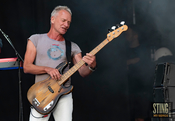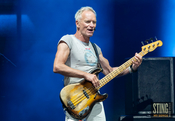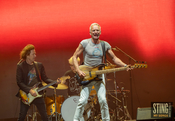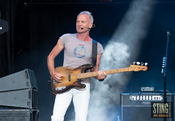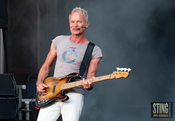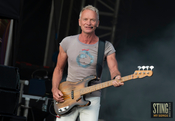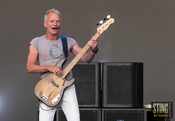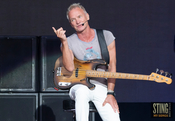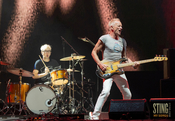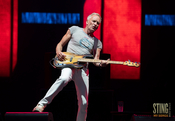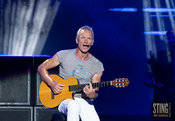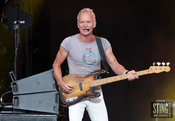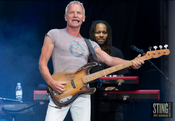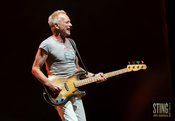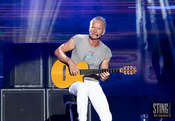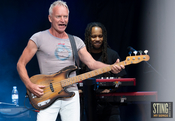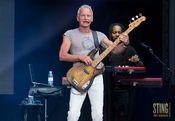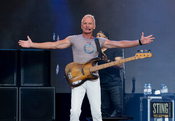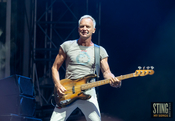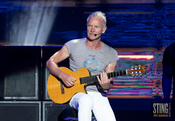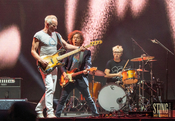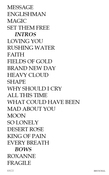
Global star Sting defies transience in front of Bruchsal's baroque palace...
London, Las Vegas, Bruchsal: On his current world tour, Sting stopped by Kraichgau on Tuesday evening. This is what the rock star's concert in front of the baroque palace went like.
It starts with "Message in a Bottle." Sting whirls onto the stage with his old hit so outrageously fresh that one would think he'd just escaped the bottle like a well-preserved genie.
In the band's first number one hit, "The Police," from 1979, numerous "SOS to the world" are sent out. The message that resonates on this summer evening at the opening of "Music in the Park" in the Bruchsal palace gardens, however, is one of confident vitality.
The fans may have grown gray in honour, but the man, whose real name is Gordon Matthew Thomas Sumner, looks the same from below.
At least the slim-fit shirt stretching over his toned muscles is torn, and the paint on Sting's Fender bass is visibly chipped. The instrument is reportedly built in 1954, making it only slightly younger than its 71-year-old owner.
Sting's "My Songs" album and the world tour of the same name, which has been running since 2019 and has been repeatedly interrupted due to the pandemic, is a refreshed compilation of his most popular songs – from his early days with "The Police" to the 17-time Grammy winner's most recent solo works.
The whole thing is packaged in a dynamic show with half a dozen musicians, including Sting's son Joe Sumner, who is also 46.
With "My Songs," Sting is back with his fans, after repeatedly preferring less mainstream music. In addition to jazz excursions, Sting also experienced a distinct renaissance phase. In 2007 and 2009, he performed with an orchestra at the Baden-Baden Festival Hall.
Even before the breakthrough of "The Police," the trained music teacher from northern England had worked with the German composer Eberhard Schoener. Born in Stuttgart, now 85 years old, he not only wrote theme songs for series such as “Die Guldenburgs” and “Derrick”, but also operas and experimented with synthesizers.
As Sting once recounted, Schoener initially booked him only as a bassist. Then the composer discovered his distinctive, husky tenor voice and recommended that he develop it further.
So now, rock music against a baroque backdrop – the first of a handful of Sting concerts in Germany this year. Fears that a global star, who has previously performed his current program in London, Singapore, and Las Vegas, might not be quite as motivated in the Kraichgau quickly prove unfounded.
Even the "Put on the Red Light" in Roxanne, the first single from the first Police album, Sting still blares as wildly as he did in 1978. The fact that he sings the shrill line at least an octave lower than in the original seems to be the artist's only concession to transience on this summer evening.
Sting and his ensemble offer almost two hours of original playing – and the occasional chat in German.
For example, during the song "Brand New Day," Sting jokingly informs his young harmonica player Shane Sager that the harmonica solo in the original from 1999 was played by the great Stevie Wonder. "Yes, sir!" the young virtuoso croons, to the delight of the native speakers in the palace garden.
The middle-class audience suggests that Sting's music has been with some for a long time. Similar to the US singer Tina Turner, who recently died at the age of 83, Sting has been one of the enduring greats of pop and rock music for decades – musical companions who wrote the soundtrack of life for generations. It's probably no coincidence that Sting recorded a duet with Tina Turner in 1996.
That even the healthiest rock star is transient is probably clear to Sting too. The singer, who reportedly employs a personal diet chef on his tour, closes the evening with the meditative "Fragile." It explores the fragility of human existence.
In Bruchsal's castle garden, dusk falls over the audience, mercifully erasing the traces of time. Were it not for a sea of cell phone lights, it could be the 1980s.
(c) Badische Neueste Nachrichten by Daniel Streib

